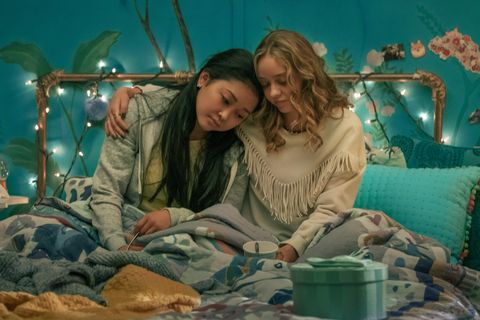By Staff Writer Maggie Lai
A sweet, balanced blend of romance and wholesome family-friend bondings, To All the Boys: Always and Forever is a heartwarming and fitting end to the To All the Boys I’ve Loved Before romantic film trilogy. The movie, in the hands of returning director Michael Fimognari, is based on the plot of the third and final book of the teen romance series of the same name by author Jenny Han. Although unable to quite recast the spell the first film of the series did, Always and Forever still stays true to the fun rom-com nature of its preceding films while taking viewers on a bona fide journey of family and identity in a teenage girl’s dilemma over what she wants in her long-term life.

The film provides a fitting end to the series.
The film observes protagonist Lara Jean Covey (Lana Condor) in her late senior year of high school as she figures out how her relationship with swoon-worthy boyfriend Peter Kavinsky (Noah Centineo) will fit into her post-high school future. Peter, who is accepted to Stanford University, hopes for Lara Jean to attend alongside him to avoid a doomed long-distance relationship. Alas, this dream is shattered when Lara Jean is — surprise! — rejected from Stanford and has to then figure out what kind of future is best for her relationship and most importantly, herself, even if that future could be thousands of miles away from her beau.

Lara Jean and Peter’s relationship is put to the test when Lara Jean must decide where she wants to attend college in the future.
While the two previous films of the To All the Boys trilogy were hyper-focused on all things romance and Lara Jean and Peter’s relationship, Always and Forever shifts the spotlight more onto Lara Jean’s chemistry with her friends and family, most notably her free-spirited best friend Chris (Madeleine Arthur) and her down-to-earth sisters Margot (Janel Parrish) and Kitty (Anna Cathcart). While the film certainly does have its share of Peter-Lara Jean aww moments, its expanded focus on Lara Jean’s friendships are a welcome change from the preceding films; Chris bringing solace to Lara Jean in times of difficulty or the two dancing their hearts out at a wild New York party are reminders of their profound connection and shape Lara Jean as a further well-rounded heroine beyond her romance with Peter.

Lara Jean and her best friend Chris have a tender heart-to-heart together.
Similarly, heartfelt scenes like Lara Jean and her sisters tandem biking through the dreamy streets of South Korea and belting karaoke at the top of their lungs provide a refreshing balance between Lara Jean’s family life and love life.

Lara Jean and her sisters Margot (left) and Kitty (middle) have a karaoke bonding night together in Korea.
The core theme of family doesn’t stop there. Always and Forever’s exploration of Peter’s relationship with his estranged father (Henry Thomas) adds new depth to the movie’s plot and Peter’s character; Peter’s gradual development from holding a burning grudge against his father to allowing himself to work with his father to rekindle their bond gives audiences a touching relationship that interestingly lacks Lara Jean’s involvement and grants Peter more dimension aside from being a cookie-cutter good guy and romantic love interest.
Not only does Always and Forever revolve around love and relationships, it also makes sure to maintain its central theme — Lara Jean’s growth and personal identity. Worth mentioning is the film’s brief but memorable focus on Lara Jean’s Korean heritage, something she’s never had a genuine connection with due to her Korean mother dying early on and her father being Caucasian. On a spring break family getaway to Seoul, South Korea to learn more about her roots, Lara Jean spills to Peter on FaceTime, “This girl, she came up to me speaking Korean, and it’s like, they see me, and they think I understand and then I don’t, and it’s like I don’t belong,” a powerful sentiment that many audiences, especially those in mixed-race families, can resonate with. To top it off, Fimognari’s dedication of an entire plotline of Lara Jean’s experience of Korea and its culture is a wholehearted and uplifting ode to Lara Jean’s Asian American identity, something uncommonly seen in most rom-com films, where an exploration of a protagonist’s identity beyond the central relationship is rarely witnessed.

Lara Jean is determined to stay in touch with her Korean identity on a spring break family trip to Korea.
An aspect of the prior installations that Always and Forever keeps constant is the hallmark fan-favorite rom-com humor of the To All the Boys film series. From Lara Jean and Kitty’s playful snarky banter and love-hate dynamic to Lara Jean’s adorable trademark clumsiness when sending Peter an accidental text confirming a Stanford acceptance, there’s never a dull moment amongst the characters.

Lara Jean and her sister Kitty’s sarcastic but good-natured back-and-forths make for a memorable highlight of the film.
Even with Always and Forever’s praiseworthy themes, depth, and comedic timing, there are places where it falls short too. Title cards precede each highlight of Lara Jean’s senior year as the film progresses, such as her Korea trip and her senior prom, and although colorful and cutesy, they do absolutely nothing but deprive the film of proper transitions between settings. The storyline is thus left feeling segmented, and it’s as if Lara Jean’s highlights each tell their own individual tale, rather than merging together to create one cohesive story. The film is also unfortunately unable to recreate the same magic the first movie did for viewers; unlike the first film in the franchise, an experience full of charm and comedic inventiveness, Always and Forever’s plotline of a relationship put to the test by college and cheesy promposals is a painfully predictable formula reminiscent of other similar rom-com plots.
Although burdened with broken up and overly formulaic storylines, all is forgiven with To All the Boys: Always and Forever’s emphasis on Lara Jean’s platonic relationships with family, friends, and herself. Throughout the movie, audiences get to see Lara Jean’s personal growth reach its potential, while her and Peter’s relationship strengthens as well, all with lightheartedness sprinkled throughout in true rom-com fashion. The film’s ending is a realistic and fulfilling one, coming nearly full-circle from the first film with references to Lara Jean’s original love letters as well. Always and Forever ties the To All the Boys film series together with a charming bow, and viewers should be ready for both a case of the waterworks and an avalanche of laughs.
Stream To All the Boys: Always and Forever on Netflix.


Be the first to comment on "With Growth, Depth, and Lightheartedness, To All the Boys: Always and Forever Seals the Story with a Heartfelt Kiss"